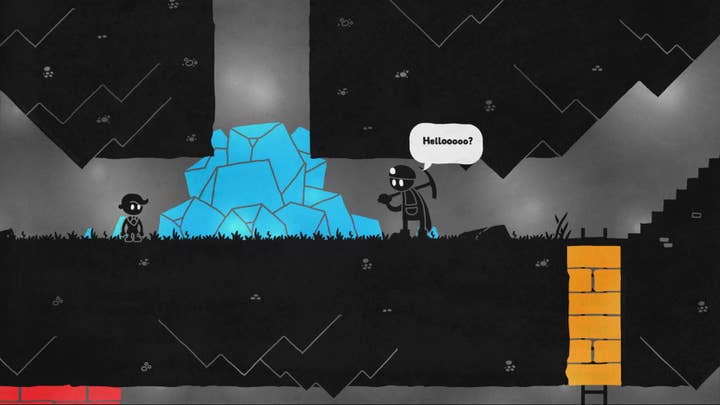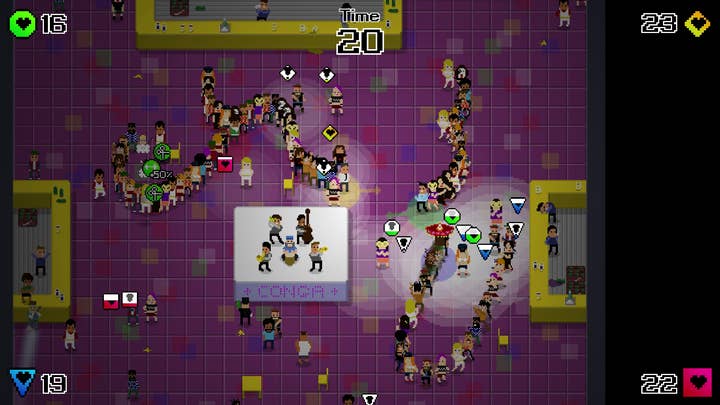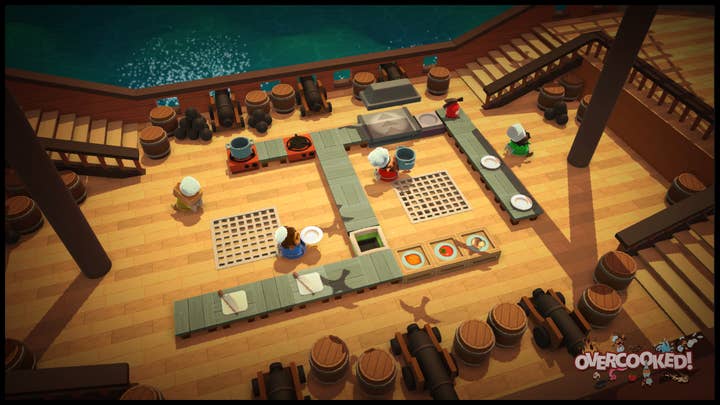What publishers look for in indie games
Road to Rezzed: We speak to several top indie games publishers to discuss why they pick the titles they do
Later this month we are running an event at EGX Rezzed that unites indie creators with the wider games business.
This includes publishers, who will be looking to find the next big thing amongst the games being exhibited at the show.
'Publisher pitching' events are common place at most major events, even London Games Festival has its own in the form of the Game Finance Market. Yet they can be tricky affairs for both parties. Meetings often take place rapidly - sometimes as quick as ten minutes - in which developers have to convey their product to the publisher, leaving time for questions and feedback.
Communications coach Jon Torrens wrote last week about techniques for indies to best sell their product, and this week we've gone one step further and asked the publishers themselves what they're looking for.
This is what they told us.
"I personally look for shiny eyes, on top of the normal - 'something special' and 'emotional impact', etcetera," says Jonas Antonsson, head of European publisher Raw Fury.
"What I mean by that is enthusiasm and love that just oozes from the developer as he talks about his game. That deep love tells you that all the little details and all the tough things that are needed to make something glorious will be taken care of. And then I hope the developers see the same in us."

Passion seems to be one of the single most important things that potential investors are looking for, but that needs to be combined with realism and foresight.
"It's really important to come across as passionate about your game, knowledgeable about the market and wise about your potential publishing partner," says Simon Byron, publishing director at Curve.
"Understanding the type of games which are exciting consumers is massively important. The market is evolving, and the games that were popular last year may not be popular now. If your game is a labour of love, that's great - but it needs to have a potential audience. And, no, quoting headline Steam Spy figures for similar games is not enough - if you are getting specific with figures, make sure you know the context.
"Feel free to ask publishers or investors as many questions as they ask you - show that making the game a success is a joint effort. Understand how they operate and what services they will provide over and above any financial support. How will they account to you? How will they pay you? And, separately, do a little digging - do they have a good reputation? What do their current developers say about them?"
"One game we've recently signed put its six-word elevator pitch front and centre - we were already on board before we'd seen anything specific
Simon Byron, Curve
Indeed, like any interview, the publisher also needs to prove itself in these meetings.
"Preparation is vital; think about who you can work with? Why do you want to work with them? Where do you think they can best help you? And don't be afraid to ask around your industry contacts," says Sold Out boss Garry Williams. "A history of slow or no payments are clues you need to heed as you prioritise your meeting schedule. There really is a development community out there, so don't be afraid to use it to your advantage."
Keeping it simple is also a key skill to try and develop before attending these meetings. You want to get the publisher to understand your title immediately, and games can be complex ideas to get across.
"One game we've recently signed put its six-word elevator pitch front and centre - we were already on board before we'd seen anything specific," continues Byron
Square Enix Collective head Phil Elliott adds: "What is the game? Why are you making it? It can sometimes take a surprisingly long time to get a clear understanding of just the main points. I generally advise people to practise their introduction - find some good words and lines that describe genre, visual style, comparisons... whatever it is that's going to give me a good indication of what you're building - right away. The more you practise those lines, the easier it'll roll off the tongue - and it's also a great way to start a meeting with confidence, since meeting publishers can be nerve-wracking for some."

Indeed, being prepared is the key to nailing these meetings.
"Planning is everything," Williams continues. "The more you can show you have thought things through, the greater the interest from a publishing partner is likely to be. Please make a business plan at the same time you are making your game design document. Business models and marketing should not be an afterthought; they should be planned in from the very beginning of a project. You are making a game, but it needs to be commercially viable, so a solid business plan and delivery schedule is as important as the games' quality.
"You need to create and to verbalise your plan. Then your publicity heartbeats and communication with your target audience need to be set, or they just won't happen. Lately on the digital side, format holders are pushing to have follow-on DLC at launch. Can you handle this? What is the timeline and cost? Could you add it to your initial pitch as an option?"
Of course, the big practical question is what to actually bring to these meetings. The advice is clear - show as much of the game as you can. The more you can showcase, the more likely you are to succeed.
"Having a demo to hand is ideal, but a video or pitch document can work equally well," continues Byron. "Whatever you pitch, make sure you also illustrate a clear plan through development, with solid financial planning and a sensible idea of milestones."
Elliott adds: "The closer you have to the final quality or execution, the lower the perception of risk from my side. If you have a working vertical slice, great - easy to see the team competence, and ability to deliver on the vision. But if you only have concept art, that's harder. Not impossible - but at least try to come up with something visual that shows me what you expect in-game action to look like."
"Pitch docs are fine, but they're just words and words can change over the course of development. It's hard to make a publisher sit up and take notice on promises alone"
Martin Mathers, Rising Star Games
Martin Mathers, developer relations at Rising Star Games, concurs: "Face-to-face or via email, what gets my attention most is the same: a playable build that shows off a good chunk of what you're doing or an extensive video demonstrating the gameplay always works best. Pitch docs are fine, but they're just words and words can change over the course of development... it's hard to make a publisher sit up and take notice on promises alone, especially in meetings like those at Rezzed. And ultimately, you need to be enthusiastic, honest and practical about what you're doing - if you've got something great, then it'll almost sell itself... almost."
Remember, says one publisher, that it's not just the games that they're buying into.
"A publisher will buy in to a team quicker than a gaming concept," says David Clark, head of publishing at KISS. "Don't worry if you have not delivered three AAA games in the past, just come across as knowing your stuff, being believable and being realistic on everything - timelines, cost and gameplay - think Dragons Den.
"With 5,000 games having launched on Steam in 2016 and a similar number likely to do so this year, why should customers invest in your game and not one of the other 4,999 games?"

First impressions count, and getting the publisher to feel engaged with you can make all the difference.
"Why not be adaptable and ask what the publisher wants to see during the meeting -trailer, game to play, formal pitch? Have them all ready to go," suggest John Polson, business developer at Humble Bundle. "The publisher will feel engaged, and you as the developer will quickly learn how to make the most of your short meeting.
"Reveal something awesome at the beginning and end of your meeting, to make strong first and last impressions
John Polson, Humble Bundle
"Other tips: Practice and wrap up with a few minutes to spare. You and the publisher will be happy you are not running late to your next meeting or having to abruptly end the chat. Reveal something awesome at the beginning and end of your meeting, to make strong first and last impressions."
Williams continues: "You are pitching to people. Hard and fast rules are important. Don't be late. Be sure of the venue and practice your pitch. Politeness really does work a simple 'Thank you for your time' at the end of a meeting really does go a long way in creating an impression."
Some publishers are even on the look out for specific things when they speak to creators. Channel 4's Games Commissioner wants to see:
"A clear proposition - getting a one sentence elevator pitch down is a good way to ensure this," he begins. "I want to see That developers are playing to their strengths. That the game is a good fit for the target audience. That there'll be something remarkable about - read Seth Godin's Purple Cow if in any doubt of the important of this. That the developers are being realistic with their ambitions, and likely to be able to do what they propose."
"I think we all know that making games is difficult, and we do this for a living also. We like to see focused, determined partners who will see this process through to the end"
Debbie Bestwick, Team17
Meanwhile, the boss of Team17 Debbie Bestwick wants: "Focus. Having goals and where you want to be in 2 years? How do you plan to achieve it? And plan for sustainability. We care about your long term goals so we will ask.
"Diligence. Make sure you've done your homework on your potential audience and competing products, if you are unsure how to tackle this, we can help."
"Honesty - at all levels - in terms of scope, resource, and requirements of what you need. Remember we will share your problems and help you if we know what they are, being honest and transparent from the start helps both sides achieve a great partnership.
"Determination - I think we all know that making games is difficult, and we do this for a living also. We like to see focused, determined partners who will see this process through to the end."
If you're an indie looking to meet people in the games business, or businesses looking to discover the next great indie talent, why not attend our Meet The Indies @ EGX Rezzed event on March 30th.
Contact Charlotte Nangle for more information on how to sign up.








